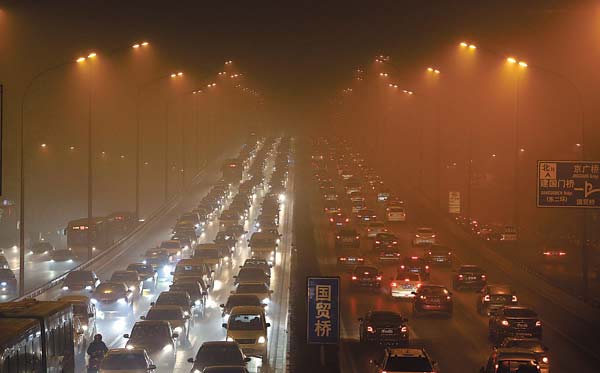Anti-pollution plan gets mixed reviews
Updated: 2013-01-21 07:18
By Cao Yin and Zheng Xin (China Daily)
|
|||||||||||
Capital proposes targeting vehicles, factories and outdoor barbecues
A top environmentalist has hailed draft measures to clean up Beijing's air as a major breakthrough - but residents seem less impressed.
The proposed Air Pollution Control Regulation targets vehicles, factories and outdoor barbecues, and it promises large fines for those who break the rules.
Environmental protection officials hope the policy will help reduce the smog that has clouded the capital in recent weeks.
 |
|
Beijing's Third Ring Road is shrouded in haze on Jan 12, 2013 as the city's air pollution reached hazardous levels. [Agencies] |
For Feng Yongfeng, founder of Green Beagle, the regulation is a step in the right direction.
"It's more transparent (than the legislation introduced in 2000) and focuses more on public concerns, which shows the government has attached more importance to the voice of the people," he said on Sunday. "Gauging public opinion will help tackle the problem."
The draft, which is open for comments until Feb 8, requires authorities to forecast pollution levels, and take firm action, including suspending production at factories and ordering vehicles off the city's roads.
Rule-breakers will face fines from 50,000 yuan ($8,040) to 500,000 yuan.
Feng said the draft strengthens guidance and supervision, while increasing penalties for bad behavior. But he warned it will still take time to deal with the capital's air problems.
For larger polluting companies, a penalty of 50,000 yuan simply will not contain their illegal behavior, as the cost of abiding by the law is much higher than breaking it, Feng said.
The government should also increase punishments that target the major polluting industries, he added.
Because a third of the city's PM2.5 (particulate matter smaller than 2.5 microns in diameter) is contributed by neighboring cities, the capital's efforts simply cannot solve the problem by themselves, he added.
Another issue could be the regional traffic restriction in the regulation, which fails to give more details on what kind of vehicles and industries should be targeted on heavy smog days. This has concerned some residents.
"I can't go to school by bus or taxi if my car is ordered off the road," said Huang Jing, 20, who drives to a university in Fengtai district every day. Even after reading the draft on the Internet, he said he did not know whether his car will be restricted.
"The bus takes too much time, and everyone knows how hard it is to get a taxi," he said. "I look forward to a more specific explanation."
Shen Jingjing also said she felt the restriction might inconvenience residents.
Related Stories
Beijing to restrict cars on roads in polluted days 2013-01-19 21:12
Pollution triggers breathing woes 2013-01-16 00:38
Pollution is a crisis for public health 2013-01-15 17:25
Pollution may make economy splutter 2013-01-15 03:28
Dealing with Beijing pollution 2013-01-14 11:23
Pollution masks given to outdoor workers 2013-01-14 02:49
Today's Top News
Police continue manhunt for 2nd bombing suspect
H7N9 flu transmission studied
8% growth predicted for Q2
Nuke reactor gets foreign contract
First couple on Time's list of most influential
'Green' awareness levels drop in Beijing
Palace Museum spruces up
Trading channels 'need to broaden'
Hot Topics
Lunar probe , China growth forecasts, Emission rules get tougher, China seen through 'colored lens', International board,
Editor's Picks

|

|

|

|

|

|





